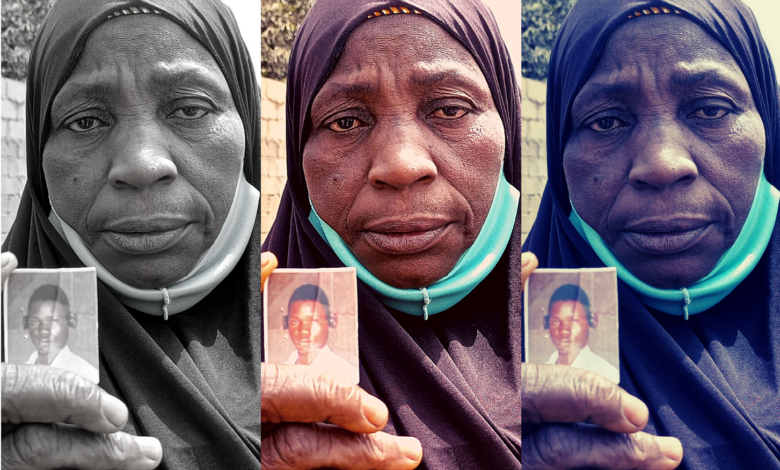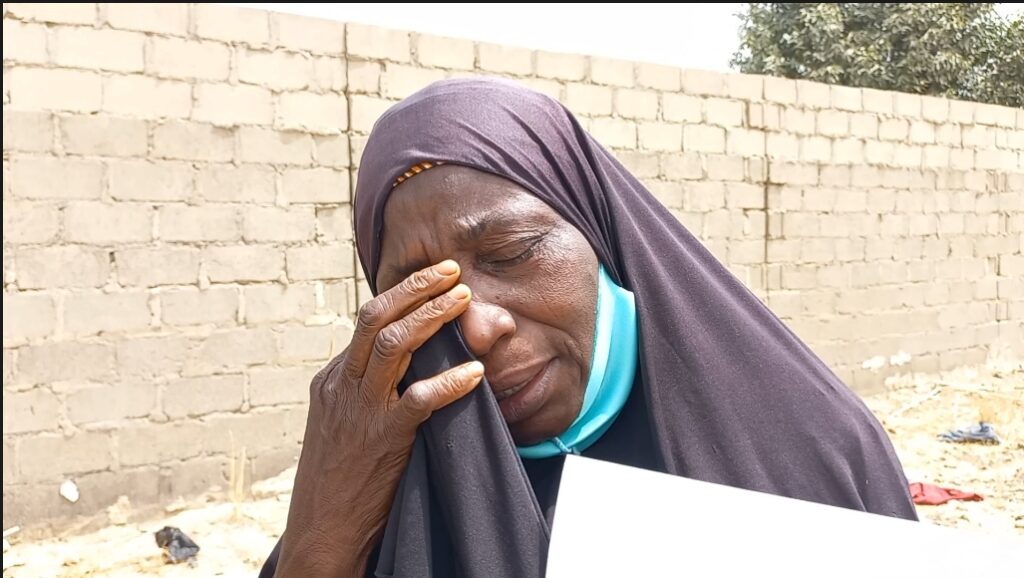The Pain Of A Mother Whose Son Remains Missing 10 Years After Arrest
Many mothers and wives in Borno, Northeast Nigeria, have been submerged in the pool of sorrow, uncertain about the whereabouts of their loved ones who were arrested by soldiers many years earlier as part of counterinsurgency operations.

A fading passport photograph and memories of the time they spent together are all that remind Zainab Idris of her son. Musa had gone missing 10 years ago after his arrest by Nigerian soldiers on allegations linking him with Boko Haram.
She swore that her son was wrongly indicted and arrested.
In the picture she has of him, Musa is wearing a pair of headphones. “He was about 20 years old when I was informed on a very sad day that soldiers of the Nigerian Army had arrested him and taken him to the barracks as a Boko Haram suspect,” Zainab said.
Musa had picked up tailoring skills after his secondary school education. He was going to a market in Maiduguri to buy sewing threads during the arrest.
“He was not a Boko Haram member,” his mother insisted.
“He lived with me, and I was the one who had his sewing machine and gave him money to rent a shop after he had learnt the trade. The morning he left the house before soldiers arrested him, he told me he was going to the market along Baga road before going to his shop.”
Since the incident in 2012, Zainab has not set eyes on her son.
“We learnt he was taken alongside other young persons to the Giwa Barracks here in Maiduguri and we kept frequenting the place but no one told me the whereabouts of my dear son,” she said.
“My son was a good boy. He did not stay up late at night. He was committed to his tailoring job, and that gave me joy that he would turn out a responsible man. He does not even share extreme thoughts about religion, how then could such a boy be labelled Boko Haram?”
The agonised mother said she had heard from multiple sources claiming to sight Musa in different detention cells, but “nothing concrete has been established about his whereabouts”.
Amnesty International estimates that, between 2009 and 2015, at least 20,000 men and boys were arrested and detained without trial by the military in connection with the Boko Haram insurgency, with more than 7,000 of them dying of starvation, suffocation, or torture.
Female relatives of some of the detainees and missing persons, under a group called Jire Dole, recently confirmed that 450 of the about 3,000 Boko Haram suspects released in the past few years were their families.

Zainab said that even if her son was a Boko Haram accomplice, an assumption she strongly disagreed with, the military has no moral justification for keeping him and others for up to a decade, especially at a time when even confirmed Boko Haram terrorists are being let off the hook.
“My child was wrongly suspected to be a member of Boko Haram and he was detained for ten years. Yet the same government that detained him is receiving and pardoning the real terrorists who had killed people and confessed to the crime. This is not fair. We plead with President Buhari and Governor Zulum to listen to us with the mind of a kind leader. They should be just.
“Many mothers whose children have been taken away in this manner have either developed high blood pressure or have died of depression. I know what I have gone through since the disappearance of my only son. I need to know if he is still alive or dead.”
Zainab is only one of hundreds of women whose loved ones have either disappeared or were kept in detention facilities after they were reportedly arrested by the Nigerian military.
The Nigerian military had, after the insurgency broke out, made hundreds of sweeping arrests in Maiduguri neighbourhoods known as flashpoints of Boko Haram hostilities or hideouts. It was a common practice for soldiers to assemble all male residents of a particular locality and then carry out a random selection of likely suspects who would be moved to the Giwa barracks detention centre, or other locations around the city.
The military had in the past years released hundreds of Boko Haram suspects after years of being in detention cells. In Jan. 2018, the state released 244 suspects to the Borno state government. The state government, in 2020, said a total of 1,400 Boko Haram suspects were released and rehabilitated after they were carefully screened.
Last July, the military again cleared over 1,000 detainees from the Giwa barracks and Maximum-Security Prison for release after confirming they were not members of the insurgent group.
This report was produced in partnership with the Open Society Initiative for West Africa (OSIWA) under the Missing Persons Register’s Population and Amplification Project.
Support Our Journalism
There are millions of ordinary people affected by conflict in Africa whose stories are missing in the mainstream media. HumAngle is determined to tell those challenging and under-reported stories, hoping that the people impacted by these conflicts will find the safety and security they deserve.
To ensure that we continue to provide public service coverage, we have a small favour to ask you. We want you to be part of our journalistic endeavour by contributing a token to us.
Your donation will further promote a robust, free, and independent media.
Donate HereStay Closer To The Stories That Matter




